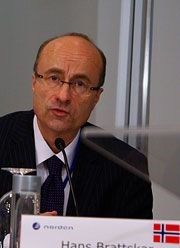Promoting Gender Equality and Empowering Women and Girls through Education
Historisk arkiv
Publisert under: Regjeringen Solberg
Utgiver: Utenriksdepartementet
New York, 12. mars 2014
Tale/innlegg | Dato: 12.03.2014
- The Norwegian government will increase our investment in education in development significantly. A large share of this funding will target girls, sa statssekretær Hans Brattskar på det nordiske ministermøtet i forbindelse med FNs kvinnekommisjon i New York.
Today, nine out of ten children in the world are enrolled in primary school. Who would have believed that when we agreed on the Millennium Development Goals thirteen years ago?
Never before has the world seen such a rapid increase in the number of children in education. Major progress has also been made in reducing the gender gaps in school, but girls are still disadvantaged. In 1 out of 3 countries gender parity has not been reached in primary education at the expense of girls, and the gap in secondary education is even larger.

Girls’ equal participation in education is not only a human right, it also contributes to economic, social and democratic development. To extend schooling for girls beyond primary school is among the most profitable investments a country can make. Education provides skills that qualify people for jobs and creates business opportunities. The inherent dynamics of economic activity result in income to the private sector, revenues to the state and broader economic growth.
Investing in education enhances our efforts for development and can be a real game changer in the fight against poverty. Investing in girls’ education is the ultimate weapon. We know that when you invest in a girl’s education in a developing country, she feeds herself, her children, her community and her nation, and charts a path towards a better world in which human rights are respected. Unesco’s Director General Irina Bokova has said: “When girls are educated, livelihoods are improved, economic growth is increased, and civic responsibility is enhanced”.
An efficient education system is needed to provide access to knowledge, but also in order for people to assert their rights and to contribute to a more democratic and sound development of their societies. However, deep-rooted inequalities result in unequal access to education. Of 750 million illiterate people in the world, 2/3 are women. It seems evident to me that girls’ education needs to be a primary focus in all development efforts.
Providing education for girls is closely linked to success in other fields of development, especially health. Educated young women have smaller families and healthier children and are more likely to send their children to school. They will all be better equipped to protect themselves from malnutrition, hiv/aids, human trafficking, and sexual exploitation. 9 out of 10 pregnant teenage girls in the world are married. If a girl finishes secondary education, the chance of her becoming a teenage mother is reduced by 60 per cent. She will get married later, have fewer children, nourish them better and she is more likely to get paid work.
In war, conflict and natural disasters where development is halted and people suffer, girls suffer the most. Girls with disabilities are the most vulnerable of all. However, we need to remember that women and girls are not primarily victims – they also represent an untapped resource. They have a right to protection, but more importantly, they have the right to equal opportunities – in the most straightforward sense. Education for girls represents a key to their empowerment and to the achievement of their rights.
A key characteristic of countries that succeed to develop health and education services is that they have prioritized these sectors in their own budgets. National ownership is essential in order to coordinate international and national resources and provide clarity for how and where efforts should be focused. National ownership is a key principle for successful development.
The Norwegian government will increase our investment in education in development significantly. A large share of this funding will target girls. Over the coming years, we will strengthen our efforts to secure access to high-quality education for girls and young women. We believe this is one of the most efficient contributions we can make, to sustainable development, to democracy and participation, to poverty eradication, and to equal opportunities for all.
Thank you.